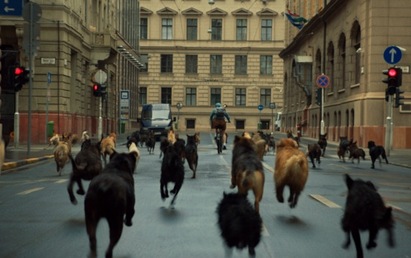C+ | A teenage girl is separated from her beloved dog. Directed by Kornel Mundruzco Initial Review by Jon Kissel |

Where Lili's trajectory is towards acknowledgement, Hagen's life is being defined for him. From day one with Daniel, Hagen is left to howl in the bathroom by himself. His friendliness while Lili is practicing her trumpet becomes the tipping point, as his own best qualities damn him towards suffering. Daniel throws Hagen out for the offense, left vainly to run after Lili until her car's out of sight. From there, he gets reclassified downward from beloved pet to mutt to mongrel to killer. Eons of evolution and breeding have made dogs adaptable and Hagen plays each role well, but each step he gets further from his initial introduction, it becomes less and less certain if he can ever get back to playing with Lili in a sun-dappled yard.
That question of rehabilitation is effective throughout the film because the relationship between Lili and Hagen is so perfect. This is basically how I imagine MMC member Ashli and her dog Fender, like if Fender ripped several throats out, she'd still play him the trumpet to calm him down and stare in his eyes. Lili does all the dog-human signifiers, like feeding him under the table and wanting to sleep in the same bed. Interestingly, on a sojourn out into the countryside, they watch a dog and its owner practice obedience, while Lili whispers to Hagen that that will never be them. It's not that Hagen doesn't do what he's told necessarily, but that they won't ever have that relationship of master and pet. In a way that I think Psotta and Bodie/Luke portray convincingly, they are somehow equals.
Going into White God, I only knew about the third act, and Mondruczo delivers on the zombie-like aspects. He owes a debt of gratitude to Danny Boyle and 28 Days Later, as the opening shots and the climax both came heavily borrowed. During that climax, tribute must be paid to the sequence of the dogs stalking through the dog-fighter's house, culminating with the fantastic shot of a growling Hagen slowly trotting out of the darkness, watching while his former master is mauled. In the rest of the film, Mondruczo captures things clinically. The butchering of the cows at Daniel's job sets up the relationship the film is going to explore between man and animal, and pulls no punches in flinching from gore and viscera. At the same time, he is neither manipulative nor cruel when depicting the harsher parts of White God. The viewer doesn't need to see Hagen beaten, as the chain straining against its tether will suffice. The dog fight is appropriately brutal, as is the mournful look in Hagen's eyes as his opponent is dragged away. In lighter scenes, like waiting for Hagen to burst out of the orchestra closet, Mondruczo waits longer that I expected to have Hagen interrupt everything and seal his fate, building tension past when I thought it would explode.
The most impressive part of Mondruczo's efforts is in the performances he coaxes out of the animal actors. Make no mistake, I liked Psotta and Zsoter fine, but I am baffled at how Bodie and Luke, Hagen's dog friend, and the other dogs were portrayed. It's completely natural dog behavior, despite the distraction of having a film crew surrounding the animal. I don't want to imply that dogs are emotionally limited, because it's impossible to know if that's true, but I was shocked at how well Bodie/Luke communicated exactly what both the movie wanted them to feel and what I thought the actual dog was feeling. There's Hagen poking the dead dog, watching the dog being put to sleep, in the aftermath of the fight, and the frequent reunions with his dog friend, and several more instances where I was in that dog's head.
White God doesn't completely pop for me and left me slightly cold, but it's memorable for containing one of the all-time best animal performances. The story works as a Rise of the Planet of the Apes-style rebellion, and as a coming-of-age story before culminating in a zombie film that ends in a sweet period between the zombies finding their humanity and their imminent deaths. I liked that last shot a great deal, but I think the movie ended there because in another 30 seconds, all those dogs were going to be killed by the police. Hagen was driven to rage and murder, but come on, he's gotta go. Sorry, Lili. Mondruczo becomes one to watch for me, and White God earns a B.
 RSS Feed
RSS Feed